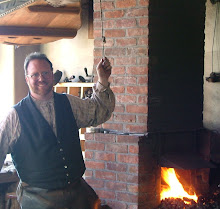Wrought iron contained a small amount of a rocky impurity called “slag” which was silica from left over from the rocky ore. The more the iron is forged the more the impurities are worked out of the iron. As it was forged out, folded into layers, and re-welded it became more refined. Iron could be refined through the stages of muck bar, merchant iron, single refined, twice refined, and triple refined. Each refinement produced a finer grain within the iron and silica.
Here is a refined bar:
One way to identify wrought iron is to cut a bar partially through and then break it. If the break looks fibrous and stringy, it is likely wrought iron. You can see that in this cut piece:Here is a refined bar:
Wrought iron is very tough, malleable, and forges nicely. However, it cannot be hardened for a good cutting edge. That requires steel--an alloy of iron and carbon. Here is a traditionally forged hammer head that has a wrought iron body and a steel face forge welded on each end:
Wrought iron was the main material used by blacksmiths until the late 19th century. The Bessemer process of making steel directly from ore was used by Carnegie Steel, and was responsible for making steel cheap. As steel became more affordable in the late 19th century it helped produce a profusion of tools and hardware made of steel. Wrought iron continued to be made through the 1940’s but it never regained prominence as the primary metal of industry.





Greetings, Steve -
ReplyDeleteMy name is Julia and I'm a producer at TV production company. We're currently producing a documentary that talks about the raw material 'wrought iron' and we're looking for images (video or still images) that visualize it. Would you be able to provide us with some photos for inclusion in the program?
Looking forward to hearing from you.
Best,
Julia
jdorn@hoff.tv
This is a blog to read out for sure. I found you have a really awesome writing style.Its simple and easy to understand.Your blog design is so clean too! Thank you for all the hard work!
ReplyDeleteIron Fences Calgary , Powder Coating Calgary
Interesting reaad
ReplyDelete